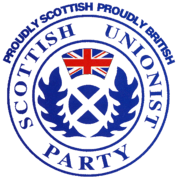Scottish Unionist Party (1986)
Scottish Unionist Party | |
|---|---|
 | |
| Leader | Jim Doughty |
| Chairman | Jim Nixon |
| Founded | 1986 |
| Ideology |
Anti-Scottish independence British unionism[1] |
| Political position | Centre-right |
| Religion | Protestantism |
| Colours | White and Royal blue (the colours of the Scottish Saltire) |
| Local government in Scotland |
0 / 1,222 |
| Website | |
|
www | |
The Scottish Unionist Party (SUP) is a minor political party in Scotland. It is ideologically a Unionist party, supporting the continuation of Scotland and Northern Ireland as a part of the United Kingdom. It is also anti-devolution, advocating the abolition of the Scottish parliament.
History
The SUP was formed in 1986 by a number of members disillusioned with Margaret Thatcher's Conservative government's signing of the Anglo-Irish Agreement. In its early years, the party found a great deal of support amongst members of the Scottish Orange Order.[2]
Many traditional supporters of the Scottish Conservative and Unionist Party and others felt that the signing of the treaty giving the Republic of Ireland a role in the government of Northern Ireland was a betrayal of the Unionists in that part of the United Kingdom and the associated Protestant community.
Electoral performance
The SUP has contested a number of elections, including the Scottish Parliament elections in 1999, 2003, 2007 and 2011. In 2003, the SUP contested only the Glasgow, Central Scotland and West of Scotland Additional Members System electoral regions, yet failed to poll enough votes to elect an MSP. It also contested only six local council wards in 2003, all located in the west central belt where the traditional "Orange vote" resides. In one Glasgow city centre seat, they achieved third place.
The SUP also stood for two seats at the 2001 General Election, in Glasgow Springburn and Airdrie and Shotts. The party managed to retain its deposit in the former, and almost did so in the latter. This was not so surprising in Springburn, for there was no Conservative and Unionist candidate since it was the constituency in which the Speaker was seeking re-election, but in Airdrie and Shotts, despite the presence of a Conservative and Unionist candidate, the SUP still managed to poll 4.5% of the vote. At the 2005 General Election the party fielded one candidate in Glasgow North East again against the Speaker, managing to achieve 4.5% of the vote, almost retaining its deposit.
The party failed to win any seats in the 2007 Scottish Parliamentary Elections and the Scottish local elections held at the same time. According to the 2007 statement of accounts with the Electoral Commission the party has 128 members, which is up by 10 on the previous year though income from memberships fell from GBP 572 to GBP 365.[3] It was deregistered by the Electoral Commission on 6 November 2009.[4]
However, the party appeared to have revived in 2012, when it ran a slate of candidates in the Glasgow Council elections, receiving 586 votes.[5]
It also fielded 2 candidates in the South Lanarkshire Council elections where their candidates received an average of 3.2% of the vote in the 2 wards it stood in.[6]
Campaigns
The SUP campaigns against what it sees as Anti-Protestant and Anti-Unionist government policies. The party is often strongly critical of mainstream parties that they view as failing to safeguard the Act of Union 1707, including the major pro-Union parties in Scotland.[7] A number of its major policies are to:[8]
- Oppose any moves to amend the Act of Settlement 1701, which disallows the British monarch from marrying or being a practising Roman Catholic.
- Abolish the devolved Scottish Parliament.
- End the present system of state funded Roman Catholic schools and work towards the creation of "multi-denominational" schools to cater to those of all faiths and none, in the belief that it will lead to greater social cohesion and an end to sectarianism.
- Increase pensions and support for senior citizens.
- Institute "zero tolerance" approaches to street crime, youth offences and drugs offences.
Youth wing
The Scottish Unionist Youth (SUY) is the youth wing of the (SUP), formed in February 2007 at a meeting of the SUP, after discussions on the matter of forming a wing within the party specifically for young Scottish Unionists between the ages of 16 and 25. The SUY is involved with all aspects of political activism on behalf of the SUP. It is not known how many members the SUY has.
See also
References
- ↑ "Database of Archives of Non-Governmental Organisations".
- ↑ "CAIN: Abstracts of Organisations - 'S'".
- ↑ "Scottish Unionist Party statement of accounts" (pdf). Electoral Commission. Retrieved 2009-04-13.
- ↑ "List of Political Parties either renamed or deregistered since 2002" (PDF). Electoral Commission. 16 December 2009. Archived from the original (PDF) on December 6, 2008. Retrieved 10 January 2010.
- ↑ "Scottish Elections". Scottish Elections.
- ↑ "Scottish Elections". Scottish Elections.
- ↑ "The Scottish Unionist Party - So-called Unionists".
- ↑ "The Scottish Unionist Party - Campaign Issues".